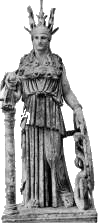 By 1820 the French were in desperate need of a classical Greek statue for the Louvre. The Italians had the Apollo Belvedere in the Vatican, and the British had just purchased the marbles Lord Elgin stripped from the Parthenon in Athens, but the French, who boasted the greatest art collection in the world, didn’t have a classical statue – something by Phidias, Praxiteles, or their students. And then, on April 8, 1820, on the island of Melos, a statue of Venus which appeared to be from the classical period was discovered. She was missing both arms, part of her left foot, and the base had crumpled, but otherwise she was in stunningly good shape. The French were quick to snatch up this newly found statue and, for the price of only 1000 francs, acquired the Venus de Milo for the Louvre.An irritating issue immediately arose. When pieces of the base were reassembled an inscription was clearly seen identifying the sculptor Alexandros of Antioch – a Syrian sculptor of the 1st Century B.C. The Venus de Milo is not of the classical period and is not a Greek statue. Someone decided to destroy, or hide those identifying pieces of the base, but not before students of the painter Delacroix had made drawings of it for their master.
By 1820 the French were in desperate need of a classical Greek statue for the Louvre. The Italians had the Apollo Belvedere in the Vatican, and the British had just purchased the marbles Lord Elgin stripped from the Parthenon in Athens, but the French, who boasted the greatest art collection in the world, didn’t have a classical statue – something by Phidias, Praxiteles, or their students. And then, on April 8, 1820, on the island of Melos, a statue of Venus which appeared to be from the classical period was discovered. She was missing both arms, part of her left foot, and the base had crumpled, but otherwise she was in stunningly good shape. The French were quick to snatch up this newly found statue and, for the price of only 1000 francs, acquired the Venus de Milo for the Louvre.An irritating issue immediately arose. When pieces of the base were reassembled an inscription was clearly seen identifying the sculptor Alexandros of Antioch – a Syrian sculptor of the 1st Century B.C. The Venus de Milo is not of the classical period and is not a Greek statue. Someone decided to destroy, or hide those identifying pieces of the base, but not before students of the painter Delacroix had made drawings of it for their master.To this day the conservator in charge of this second most recognizable piece of art in the world (behind DaVinci’s Mona Lisa), refuses to admit the pieces of the base identifying Alexandros as sculptor belong to the Venus de Milo, although detailed drawings of the reconstructed base exist. Everyone outside France recognizes the famous lady as Alexandros’ masterpiece. Early in the 20th century another reference to this Alexandros was found. It seems that in 80 B.C., Alexandros of Antioch won the prestigious poetry and singing competitions held every five years at Thespiae in Greece. He was quite a renaissance man. And today, except for the French, Art Historians give Alexandros his due.
There are so many lessons in this. We learn that people care more about their preconceptions than they do about the truth. We learn that people will take drastic, even immoral steps to protect a cherished lie. We learn that the French can, on occasion, be irritating. But I want to focus on the refusal of some to give Alexandros his due.
Were he living, Alexandros would have a whopping intellectual property lawsuit pending against the French. The Venus de Milo brings in millions a year in licensing revenues every year. Think of the licensing fees DaVinci could collect, or Bach, or Shakespeare, or the Guy who painted Dogs Playing Poker? You know whoever holds the rights to “Happy Birthday to You” makes a mint every year.
A more interesting question would be what we would do if God ever charged licensing fees? What exists that He can not claim creative rights over? DaVinci couldn’t paint a face, or Cuyp a cow, or Heade a haystack without copying a God-original.
Every good and perfect gift is from above, coming down from the Father of lights… (James 1.17) The root sin from which all others grow is not recognizing God as God, or giving thanks to Him (Romans 1.21). We may think it is about time Alexandros got his due, but he would have no human for to sculpt if God hadn’t created that form first. Isn’t it about time we gave God his due? What can we accomplish apart from the intellect, health, talents, and opportunities He provides? Can we look at anything good and say to ourselves, “I did that.”?
Whatever we do, in word or deed we do by His power, for His glory, in order to give Him thanks. (Colossians 3.17)

